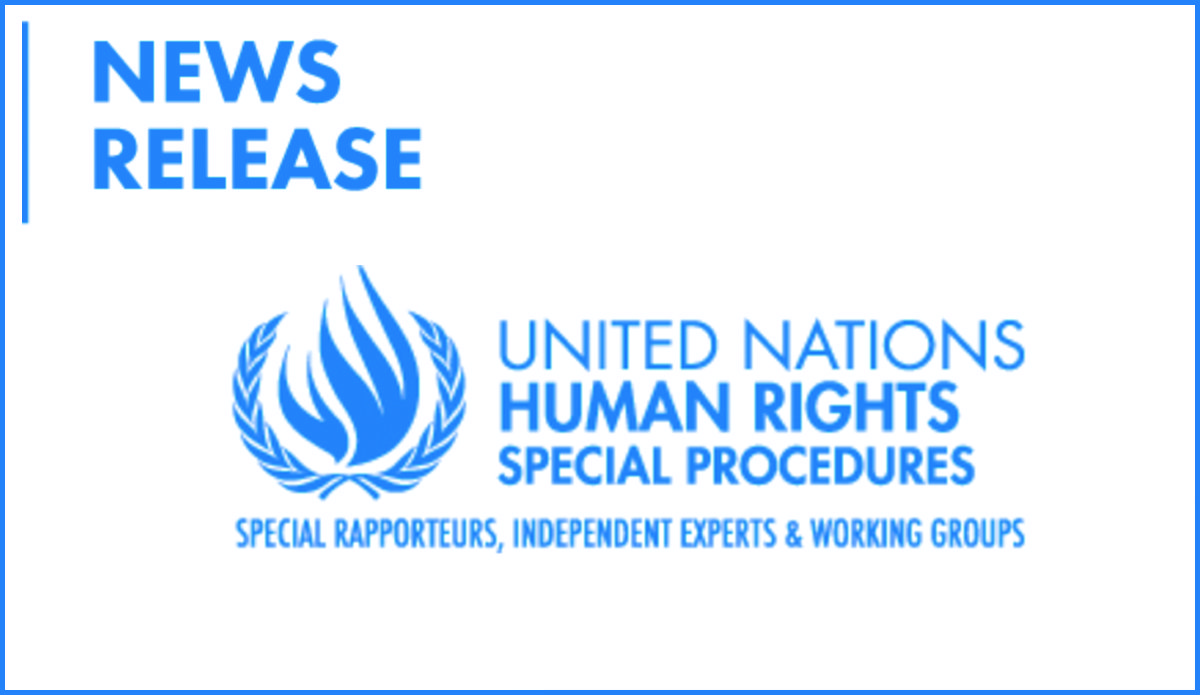Lebanon: Enforced Disappearance Act “significant step in the right direction”
GENEVA (26 November 2018) – The UN Working Group on enforced or involuntary disappearances* says a new law against enforced disappearances in Lebanon can be a major breakthrough, and urges effective implementation to give victims and their families access to truth and justice.
The law, passed on 13 November 2018, establishes a commission to investigate enforced disappearances with the power to access and collect information, carry out exhumations and identifications of burial sites and hand over to relatives the remains of their loved ones. It also enshrines the “right to know” for all families without discrimination.
“This is a significant step forward that marks a real commitment by the State to fulfill its obligations and to shed light on the past, which may help bring truth and justice to the families of the disappeared,” said the experts from the Working Group on Enforced or Involuntary Disappearances.
“We are ready to assist with the effective implementation of the law, including through an official visit,” they said, noting that Lebanon had issued a standing invitation to all UN Special Procedures mandate holders since 17 March 2011.
"We also hope that the adoption of this law will be a prelude to the ratification of the International Convention for the Protection of All Persons from Enforced Disappearance and the introduction in the criminal legislation of enforced disappearance as an autonomous crime of a continuous nature,” the experts concluded.
ENDS
*The Working Group on Enforced or Involuntary Disappearances is comprised of five independent experts from all regions of the world. The Chair-Rapporteur is Mr. Bernard Duhaime (Canada) and the Vice-Chair is Mr. Tae-Ung Baik (Republic of Korea); other members are Ms. Houria Es-Slami (Morocco); Mr. Luciano Hazan (Argentina) and Mr. Henrikas Mickevicius (Lithuania).
The Working Group was established by the then UN Commission on Human Rights in 1980 to assist families in determining the fate and whereabouts of disappeared relatives. It endeavours to establish a channel of communication between the families and the Governments concerned, to ensure that individual cases are investigated, with the objective of clarifying the whereabouts of persons who, having disappeared, are placed outside the protection of the law. It also provides assistance in the implementation by States of the UN Declaration on the Protection of All Persons from Enforced Disappearance.
The Working Groups are part of what is known as the Special Procedures of the Human Rights Council. Special Procedures, the largest body of independent experts in the UN Human Rights system, is the general name of the Council’s independent fact-finding and monitoring mechanisms. Special Procedures mandate-holders are independent human rights experts appointed by the Human Rights Council to address either specific country situations or thematic issues in all parts of the world. They are not UN staff and are independent from any government or organization. They serve in their individual capacity and do not receive a salary for their work.
For more information and media requests, please contact Mr. Ugo Cedrangolo: ucedrangolo@ohchr.org or wgeid@ohchr.org
UN Human Rights, Country Page – Lebanon
For media inquiries related to other UN independent experts:
Jeremy Laurence – Media Unit (+ 41 22 917 9826 / jlaurence@ohchr.org)
This year, 2018, is the 70th anniversary of the Universal Declaration of Human Rights, adopted by the UN on 10 December 1948. The Universal Declaration – translated into a world record 500 languages – is rooted in the principle that “all human beings are born free and equal in dignity and rights.” It remains relevant to everyone, every day. In honour of the 70th anniversary of this extraordinarily influential document, and to prevent its vital principles from being eroded, we are urging people everywhere to Stand Up for Human Rights: www.standup4humanrights.org
_________________
لبنان : “ قانون المفقودين والمخفيين قسرا “، خطوة مهمة في الاتجاه الصحيح
جنيف (26 تشرين الثاني / نوفمبر 2018) – قال الفريق الأممي المعني بحالات الاختفاء القسري وغير الطوعي* إن اعتماد لبنان لقانون “ المفقودين والمخفيين قسرا" يمثل تقدما مهما، ودعا إلى تنفيذه بفعالية من أجل تمكين الضحايا وعائلاتهم من معرفة الحقيقة والولوج إلى العدالة.
وقد نص القانون الصادر في 13 نوفمبر 2018 على إنشاء “ الهيئة الوطنية للمفقودين والمخفيين قسرا “، بصلاحيات للتحقيق في حالات الاختفاء القسري وفي الحصول على المعلومات وتوثيقها والإشراف على عمليات تحديد أماكن دفن الرفات واستخراجها والتعرف عليها وتسليمها للأقارب، كما أنه يكرس الحق في معرفة الحقيقة لجميع أقارب الضحايا دون تمييز.
وقال خبراء الفريق الأممي المعني بالاختفاء القسري وغير الطوعي إن إصدار هذا القانون يمثل خطوة هامة ويجسد التزاما حقيقيا للدولة بالوفاء بالتزاماتها، وتسليط الضوء على الماضي والكشف عن الحقيقة لفائدة أسر وأقرباء المفقودين وضحايا الاختفاء القسري.
وأضاف خبراء الفريق الاممي : "نحن مستعدون لمساعدة الحكومة في التنفيذ الفعال للقانون بمافي ذلك زيارة رسمية للبنان"، مشيرين إلى أن لبنان كان قد وجه دعوة مفتوحة دائمة لجميع الإجراءات الخاصة بالأمم المتحدة منذ 17 مارس 2011.
وعبَر الخبراء أيضا عن أملهم في أن يكون اعتماد هذا القانون بمثابة خطوة في اتجاه المصادقة على الاتفاقية الدولية لحماية جميع الأشخاص من الاختفاء القسري وإدراج الاختفاء القسري كجريمة مستقلة في النصوص التشريعية الجنائية.
انتهى
*يتألف الفريق العامل المعني بحالات الاختفاء القسري أو غير الطوعي من خمسة خبراء مستقلين من جميع مناطق العالم. والرئيس - المقرر الحالي هو السيد برنار دوهيم (كندا) ونائب الرئيس هو السيد تاي - أونغ بايك (جمهورية كوريا) ؛ والأعضاء الآخرون هم السيدة حورية اسلامي (المغرب) ؛ السيد لوسيانو هازان (الأرجنتين) والسيد هنريكاس ميكفيسيوس (ليتوانيا).
تم إنشاء فريق العمل من قبل لجنة حقوق الإنسان التابعة للأمم المتحدة في عام 1980 لمساعدة الأسر في تحديد مصير ومكان وجود الأقارب المختفين. وتسعى إلى إنشاء قنوات اتصال بين الأسر والحكومات المعنية، لضمان التحقيق في الحالات الفردية، بهدف توضيح أماكن وجود الأشخاص الذين تعرضوا للاختفاء القسري خارج نطاق حماية القانون. كما يقدم المساعدة في تنفيذ الدول لإعلان الأمم المتحدة بشأن حماية جميع الأشخاص من الاختفاء القسري.
ويعتبر الفريق العامل المعني بحالات الاختفاء القسري أو غير الطوعي جزءاً مما يعرف باسم الإجراءات الخاصة لمجلس حقوق الإنسان. والإجراءات الخاصة، أكبر هيئة من الخبراء المستقلين في نظام الأمم المتحدة لحقوق الإنسان، هي الاسم العام لآليات تقصي الحقائق والمراقبة المستقلة التابعة للمجلس والتي تتناول إما حالات قطرية محددة أو قضايا مواضيعية في جميع أنحاء العالم. ويعمل خبراء الإجراءات الخاصة على أساس تطوعي؛ فهم ليسوا من موظفي الأمم المتحدة ولا يحصلون على أجر مقابل عملهم. وهم مستقلون عن أي حكومة أو منظمة ويعملون بصفتهم الفردية.
حقوق الإنسان، صفحة دولة - لبنان
للمزيد من استفسارات وسائل الإعلام فيما يتعلق بخبراء الأمم المتحدة المستقلين الآخرين، يرجى الاتصال بـ جيرمي لورنس، مجلس حقوق الإنسان في الأمم المتحدة - وحدة الإعلام (+41 22 917 9383) jlaurence@ohchr.org
هذا العام هو الذكرى السبعين للإعلان العالمي لحقوق الإنسان، اعتمدته الأمم المتحدة في 10 ديسمبر 1948. إن الإعلان العالمي - المترجم إلى رقم قياسي عالمي بلغ 500 لغة - يتجذر في المبدأ القائل بأن "جميع البشر يولدون أحرارًا ومتساوين في الكرامة والحقوق، إن حقوق الإنسان مشتركة بين الجميع، كل يوم. و تكريماً للاحتفال بالذكرى السبعين على هذه الوثيقة المؤثرة بشكل استثنائي ، ولمنع مبادئها الحيوية من الاندثار، نحث الناس في كل مكان على الدفاع عن حقوق الانسان: www.standup4humanrights.org
________________________
Liban: Loi sur les disparitions forcées « un pas important dans la bonne direction »
GENVE (26 novembre 2018) – Le Groupe de travail sur les disparitions forcées ou involontaires des Nations Unies* a déclaré que la nouvelle loi contre les disparitions forcées au Liban peut constituer une avancée majeure dans la lutte contre les disparitions forcées et appelle à sa mise en œuvre effective afin d’apporter aux victimes et à leurs familles vérité et justice.
La loi, adoptée le 13 novembre 2018 dernier, établit une commission chargée d'enquêter sur les disparitions forcées et ayant le pouvoir d'accéder et de collecter des informations, de procéder à des exhumations et à l'identification de lieux d’inhumation, ainsi qu'à la remise des dépouilles à leurs proches. Elle consacre également le «droit de savoir» à toutes les familles sans discrimination.
« C’est un pas en avant significatif qui marque un réel engagement de l’État à s’acquitter de ses obligations et à faire la lumière sur le passé et contribuer à rendre justice et vérité aux familles des disparus » ont déclaré les experts du Groupe de travail sur les disparitions forcées.
« Nous sommes prêts à assister le Gouvernement dans la mise en œuvre effective de la loi, y compris par une visite officielle»,» ont-ils ajouté, soulignant que le Liban avait adressé une invitation permanente à tous les titulaires de mandat au titre des procédures spéciales de l’ONU, depuis le 17 mars 2011.
«Nous espérons également que l’adoption cette loi constitue un prélude à la ratification de la Convention internationale pour la protection de toutes les personnes contre les disparitions forcées et à l’introduction dans la législation pénale de la disparition forcée en tant que crime autonome à caractère continu» ont conclu les experts.
Fin
*Le Groupe de travail sur les disparitions forcées ou involontaires est composé de cinq experts indépendants de toutes les régions du monde. Le Président-Rapporteur est M. Bernard Duhaime (Canada) et le vice-président est M. Tae-Ung Baik (République de Corée); les autres membres sont Mme Houria Es-Slami (Maroc); M. Luciano Hazan (Argentine) et M. Henrikas Mickevicius (Lituanie).
Le groupe de travail a été créé par la Commission des droits de l'homme des Nations unies en 1980 pour aider les familles à déterminer le sort et la localisation des proches disparus. Il s’efforce d’établir un canal de communication entre les familles et les gouvernements concernés afin de garantir que les cas individuels fassent l’objet d’une enquête et que l’on sache où se trouvent les personnes disparues qui sont placées hors de la protection de la loi. Il aide également les États à mettre en œuvre la Déclaration des Nations Unies sur la protection de toutes les personnes contre les disparitions forcées.
Le Groupe de partie de la division des procédures spéciales du Conseil des droits de l’homme. Les procédures spéciales, l’organe le plus important d’experts indépendants du Système des droits de l’homme de l’ONU, est le terme général appliqué aux mécanismes d’enquête et de suivi indépendants du Conseil qui s’adressent aux situations spécifiques des pays ou aux questions thématiques partout dans le monde. Les experts des procédures spéciales travaillent à titre bénévole; ils ne font pas partie du personnel de l’ONU et ils ne reçoivent pas de salaire pour leur travail. Ils sont indépendants des gouvernements et des organisations et ils exercent leurs fonctions à titre indépendant.
Page du HCDH sur le pays: Liban
Pour les demandes médias liées à d’autres experts indépendants de l’ONU:
Jeremy Laurence, Unité Droits de l'homme - Médias (+41 22 917 9383 / jlaurence@ohchr.org)
Cette année est la consécration du 70ème anniversaire de la Déclaration Universelle des Droits de l’Homme adoptée par l’ONU le 10 décembre 1948. La Déclaration universelle, traduite en un record mondial de 500 langues, part du principe que « tous les êtres humains naissent libres et égaux en dignité et en droits ». Ce message reste aujourd’hui essentiel pour chaque individu, chaque jour. En l’honneur du 70ème anniversaire de ce document au caractère extraordinairement précieux, et afin d’empêcher l’érosion de ses principes vitaux, nous exhortons tous les êtres humains, partout dans le monde, à se lever pour les droits de l’homme : www.standup4humanrights.org
 UN
UN





